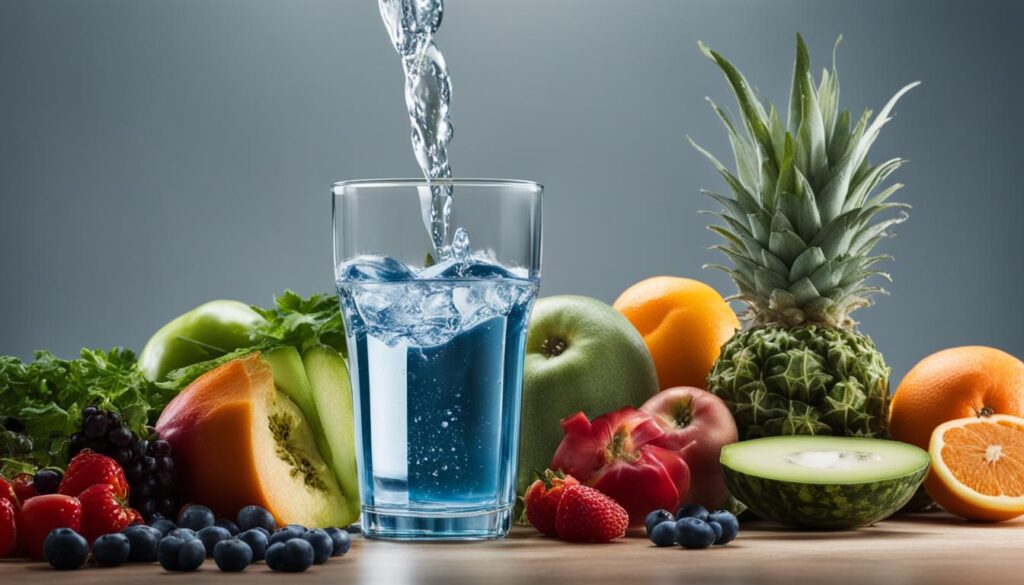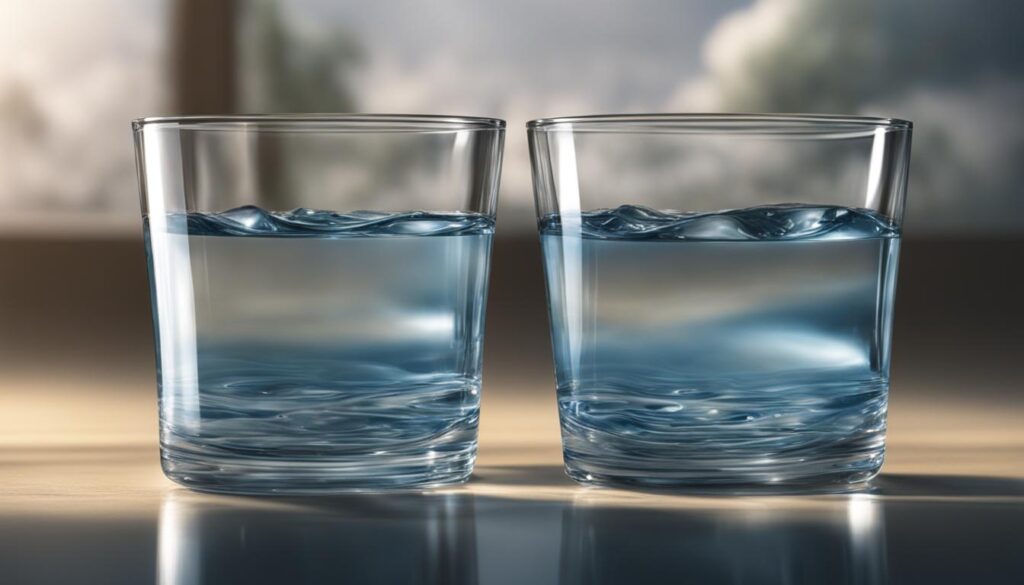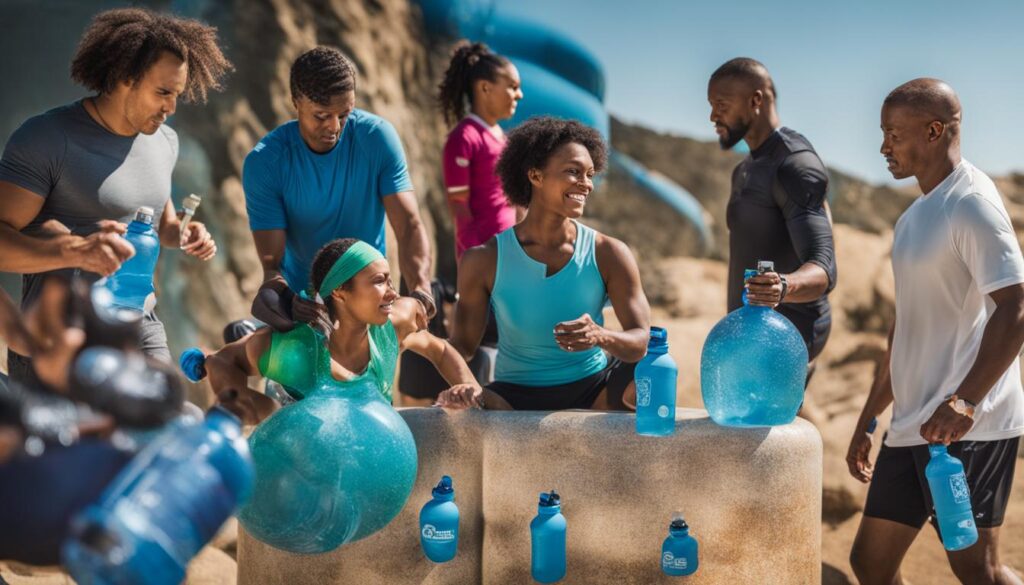In the pursuit of weight loss, many people wonder if it is permissible to consume water while on a diet. In fact, water plays a crucial role in any weight loss journey. It aids in digestion, supports muscle function, and may even contribute to shedding extra pounds. In this section, we will explore the importance of water during a diet and how it can benefit your weight loss efforts.
Key Takeaways:
- Water is essential for weight loss as it helps with digestion and muscle function.
- Increase your water consumption to create a feeling of fullness and prevent overeating.
- Proper hydration supports proper digestion and waste elimination.
- Aim to drink around 9 cups of water per day for females and 13 cups for males.
- Consider incorporating strategies to increase water intake, such as drinking water before meals and carrying a reusable water bottle.
The Role of Water in Weight Loss
When it comes to weight loss, staying hydrated is often overlooked but plays a crucial role in the process. Drinking water can aid in weight loss by creating a sense of fullness, reducing hunger, and preventing overeating. By staying hydrated, you can also boost your body’s ability to burn calories and increase resting energy expenditure.
Proper hydration is essential for digestion and the elimination of waste, both of which contribute to weight loss. Drinking water before meals can reduce appetite and calorie intake, making it an effective strategy for those trying to shed pounds. Additionally, water helps in the breakdown of fats, promoting lipolysis and fat loss.
By keeping your body properly hydrated, you support the functioning of muscles, connective tissues, and organs during exercise. This can further enhance weight loss efforts by optimizing your workout performance and helping you burn more calories. Staying hydrated is an important aspect of any diet plan and should not be overlooked in your weight loss journey.

The Role of Hydration in Fat Metabolism
Adequate hydration is crucial for the proper metabolism of fats. When the body is dehydrated, it can lead to a slowdown in metabolic processes, including the breakdown of fats. On the other hand, maintaining optimal hydration levels can help facilitate the transportation and metabolism of fats, ensuring they are effectively used as an energy source.
| Water and Metabolism | Key Points |
|---|---|
| Increased water intake can boost lipolysis and promote fat loss. |
|
The Importance of Adequate Hydration for Digestive Health
Proper hydration is essential for maintaining digestive health. Water plays a crucial role in softening stools and preventing constipation by ensuring smooth movement of waste through the intestines. When we are dehydrated, our stools can become hard and difficult to pass, leading to discomfort and bloating. By staying hydrated, we can support optimal digestion and prevent digestive problems that may hinder our weight loss efforts.
In addition to preventing constipation, water also assists the kidneys in filtering toxins and waste from the body. When we are dehydrated, our kidneys may not function optimally, leading to an accumulation of waste products in the body. This can have a negative impact on our overall health and well-being. By drinking enough water, we can support our kidneys in their important role of waste removal.
Incorporating water-rich foods into our diet can also contribute to adequate hydration and optimal digestive health. Fruits and vegetables, such as watermelon, cucumber, and celery, have high water content and can help in maintaining hydration levels. Including these foods in our diet not only provides us with essential nutrients but also helps to keep our digestive system functioning properly.

The Importance of Regular Water Intake
“Water is not only necessary for survival but also plays a critical role in maintaining digestive health. It helps to soften stools, prevent constipation, and eliminate waste products from the body. Staying adequately hydrated is key to supporting healthy digestion and overall well-being.” – Dr. Emily Smith, Gastroenterologist
By prioritizing hydration and ensuring we drink enough water throughout the day, we can support our digestive system and enhance our weight loss efforts. Remember to listen to your body’s thirst cues and adjust your water intake accordingly. Stay hydrated and enjoy the benefits of a healthy digestive system!
Strategies for Increasing Water Intake
Increasing your water intake is essential for staying hydrated and supporting weight loss efforts. Here are some effective strategies to help you drink more water and incorporate it into your diet:
1. Drink a glass of water with each meal
Make it a habit to have a glass of water before, during, or after every meal. This not only helps you stay hydrated but also aids in digestion and can help control your appetite.
2. Carry a reusable water bottle with you
Having a reusable water bottle with you at all times makes it easier to stay hydrated throughout the day. Fill it up in the morning and make a conscious effort to finish it by the end of the day.
3. Drink extra water during exercise or in hot weather
When you’re working out or in hot weather, your body loses more water through sweat. It’s important to replenish those fluids by drinking extra water during these times. Keep a water bottle handy during workouts and outdoor activities.
4. Consume water-rich foods
Incorporate fruits and vegetables with high water content into your diet. Examples include watermelon, cucumbers, strawberries, and spinach. These foods not only provide hydration but also add essential nutrients to your meals.
Remember to be mindful of liquid calories and replace sugary drinks with water or other no-calorie beverages. By following these tips, you can increase your water intake and support your weight loss goals.
| Tip | Description |
|---|---|
| Drink water with every meal | Make it a habit to have a glass of water before, during, or after every meal. |
| Carry a reusable water bottle | Keep a reusable water bottle with you at all times to stay hydrated throughout the day. |
| Stay hydrated during exercise | Drink extra water during workouts or when in hot weather to replenish lost fluids. |
| Incorporate water-rich foods | Add fruits and vegetables with high water content to your meals to increase water intake. |
By following these tips, you can increase your water intake and support your weight loss efforts. Remember, staying hydrated is essential for overall health and well-being.

Water and Intermittent Fasting
During intermittent fasting, the rules regarding water intake can vary depending on the specific fasting protocol you are following. In general, water is allowed and does not break the fast. It does not significantly affect blood sugar or insulin levels, making it a suitable beverage to consume while fasting. However, it is important to consult with a healthcare provider or a registered dietitian before starting any fasting regimen, especially if you have specific health concerns or are considering dry fasting.
Staying hydrated during intermittent fasting is crucial to support overall health and well-being. Water helps regulate body temperature, aids in digestion, and assists in toxin elimination. It can also help reduce hunger pangs and cravings, making it easier to adhere to your fasting schedule and control calorie intake. Remember to listen to your body’s thirst cues and drink water whenever you feel thirsty, even if it falls within your fasting window.
If you find plain water boring or want to add some flavor, you can infuse it with fruits or herbs like lemon, cucumber, or mint. However, it is important to avoid adding any sweeteners or calories to your water, as they can break your fast and disrupt the metabolic benefits of fasting. Stick to plain water or unsweetened herbal tea to stay properly hydrated during your fasting periods.
Hydration and Fasting Tips
- Drink water whenever you feel thirsty, even during your fasting window.
- Avoid adding sweeteners or calories to your water, as they can break your fast.
- Infuse your water with fruits or herbs for added flavor, without adding any calories.
- Stay mindful of portion sizes and avoid excessive water intake, as it can lead to water intoxication.
- Consult with a healthcare provider or registered dietitian before starting any fasting regimen.
| Intermittent Fasting Protocol | Allowance for Water |
|---|---|
| Time-Restricted Eating | Water is allowed during the fasting window. |
| Alternate-Day Fasting | Water is allowed during the fasting days. |
| 5:2 Fasting | Water is allowed on the fasting days with limited calorie intake. |
| Extended Fasting | Water is allowed during the fasting period, but medical supervision is recommended for fasts longer than 24 hours. |
Remember, while water is generally allowed during intermittent fasting, it is important to follow the specific guidelines of your chosen fasting protocol and listen to your body’s needs. Fasting can have different effects on individuals, so it is crucial to pay attention to your overall well-being and consult with a healthcare professional if you have any concerns.

The Link Between Water Intake and Weight Gain
When it comes to managing weight, increasing water intake and reducing the consumption of sugary and high-calorie beverages can make a significant difference. Studies have shown that people who drink more water tend to have lower calorie intake and are less likely to become overweight or obese. By replacing just one serving of a sugary drink with water each day, you can significantly decrease your overall calorie intake and decrease the risk of obesity.
Water has no calories, so it can be a great choice for quenching thirst without adding extra calories to your diet. Additionally, water can help create a feeling of fullness, reducing the temptation to snack or overeat. By drinking water throughout the day, you can help curb cravings and maintain a healthier calorie balance.
Another way that water can aid in weight management is by supporting metabolism. When the body is properly hydrated, metabolism functions optimally, allowing for efficient calorie burning. Staying hydrated also supports the proper functioning of muscles, which is essential for physical activity and exercise, both of which contribute to weight loss.
To prevent weight gain and support weight management, it is important to prioritize water intake and make it a part of your daily routine. By incorporating strategies such as drinking water before meals, carrying a reusable water bottle, and choosing water over sugary beverages, you can ensure that you are staying properly hydrated and supporting your weight loss goals.
Table: Calorie Comparison of Common Beverages
| Beverage | Calories per Serving |
|---|---|
| Soda (12 oz can) | 150 |
| Juice (8 oz glass) | 120 |
| Sports Drink (20 oz bottle) | 130 |
| Iced Tea (16 oz) | 90 |
| Coffee with Cream and Sugar (12 oz) | 150 |
| Water (12 oz) | 0 |
By choosing water over these high-calorie beverages, you can easily reduce your daily calorie intake and support your weight management efforts. Remember, every small change adds up, and making water your go-to beverage can have a big impact on your overall health and weight.

The Individualized Nature of Water Requirements
When it comes to water intake during a diet, the amount each person needs can vary based on individual factors. Factors such as age, activity level, body size, and environmental conditions can all influence how much water you should drink. While a general guideline is to drink eight 8-ounce glasses of water per day, it’s important to listen to your body’s thirst cues and adjust your water intake accordingly.
Age is an important factor to consider when determining your water needs. Older adults may have a decreased sense of thirst, making it essential to drink water even if you don’t feel thirsty. Additionally, physical activity and environmental conditions play a role. If you engage in intense exercise or live in a hot climate, you may need to increase your water intake to stay properly hydrated.
Another factor that can affect water needs is body size. Larger individuals generally have a higher water requirement than smaller individuals. It’s also worth noting that certain health conditions, such as kidney disease or diabetes, may require adjustments to your water intake. Always consult with a healthcare professional to determine the best water intake for your specific needs.
Factors Affecting Water Intake:
- Age
- Activity level
- Body size
- Environmental conditions
- Health conditions
Customizing your water intake is key to ensuring you stay properly hydrated during a diet. Pay attention to your body’s signals of thirst and adjust your water intake accordingly. If you’re unsure about your water needs, consider consulting with a registered dietitian or healthcare professional who can provide personalized recommendations based on your unique circumstances.

Conclusion
In conclusion, water plays a crucial role in weight loss and overall health during a diet. By drinking enough water, you can curb your appetite, increase calorie burn, support digestion, and prevent dehydration. It is recommended that females aim for around 9 cups of water per day, while males should aim for around 13 cups. However, individual water needs may vary based on factors such as activity level, age, body size, and environmental conditions.
To incorporate more water into your diet, try strategies such as drinking water before meals, carrying a reusable water bottle with you, and opting for water-rich foods. Remember to be mindful of liquid calories and replace sugary beverages with water or other calorie-free options. While water is generally permitted during intermittent fasting, it’s important to follow specific guidelines and consult with a healthcare provider.
While water is an important component of a weight loss plan, it’s essential to combine it with a balanced diet and regular exercise for optimal results. Keep in mind that everyone’s journey is unique, and it’s important to listen to your body’s individual thirst cues and adjust your water intake accordingly. By prioritizing hydration and making water a part of your daily routine, you can support your weight loss efforts and improve your overall well-being.
FAQ
Can I drink water while on a diet?
Yes, drinking water is important during a diet. It helps with digestion, muscle function, and can create a feeling of fullness, reducing hunger and preventing overeating.
How much water should I drink during a diet?
The amount of water you should drink during a diet depends on factors such as activity level, age, body size, and environmental conditions. Generally, females should aim for around 9 cups of water per day, while males should aim for around 13 cups.
What role does water play in weight loss?
Water can help with weight loss by creating a feeling of fullness, increasing calorie burn, supporting proper digestion, and preventing dehydration.
How does water impact metabolism?
Drinking enough water is essential for the proper metabolism of stored fat and carbohydrates. It helps in the process of lipolysis, which involves the breakdown of fats, and supports muscle function during exercise.
Why is adequate hydration important for digestive health?
Water helps to soften stools, prevent constipation, and support proper digestion and waste elimination. Dehydration can lead to digestive discomfort, bloating, and hard stools.
What are some strategies for increasing water intake while on a diet?
You can drink a glass of water with each meal, carry a reusable water bottle, drink extra water during exercise or in hot weather, and consume water-rich foods like fruits and vegetables.
Can I drink water during intermittent fasting?
Yes, water is generally permitted during intermittent fasting as it does not affect blood sugar or insulin levels. However, it’s important to follow specific fasting guidelines and consult with a healthcare provider.
Does water intake affect weight gain?
Increasing water intake and reducing the consumption of sugary and high-calorie beverages can help decrease overall calorie intake and prevent long-term weight gain.
How individualized are water requirements?
The amount of water each person needs can vary based on factors such as activity level, age, body size, and environmental conditions. It’s important to listen to your body’s thirst cues and adjust your water intake accordingly.
What is the conclusion about water and dieting?
Drinking water while on a diet is crucial for weight loss and overall health. It helps curb appetite, burn calories, support digestion, and prevent dehydration. Remember to combine water intake with a balanced diet and exercise for optimal results.




